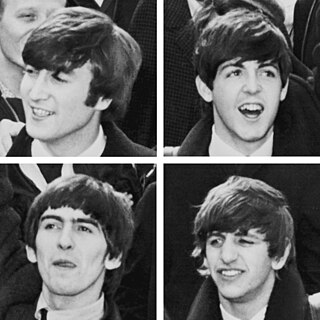
The Beatles were an English rock band formed in Liverpool in 1960, comprising John Lennon, Paul McCartney, George Harrison and Ringo Starr. They are regarded as the most influential band of all time and were integral to the development of 1960s counterculture and the recognition of popular music as an art form. Rooted in skiffle, beat, and 1950s rock 'n' roll, their sound incorporated elements of classical music and traditional pop in innovative ways. The band also explored music styles ranging from folk and Indian music to psychedelia and hard rock. As pioneers in recording, songwriting and artistic presentation, the Beatles revolutionised many aspects of the music industry and were often publicised as leaders of the era's youth and sociocultural movements.

Let It Be is the twelfth and final studio album by the English rock band the Beatles. It was released on 8 May 1970, almost a month after the group's public break-up, in tandem with the documentary of the same name. Concerned about recent friction within the band, Paul McCartney had conceived the project as an attempt to reinvigorate the group by returning to simpler rock 'n' roll configurations. Its rehearsals started at Twickenham Film Studios on 2 January 1969 as part of a planned television documentary showing the Beatles' return to live performance.

"Get Back" is a song recorded by the British rock band the Beatles and Billy Preston, and written by Paul McCartney though credited to the Lennon–McCartney partnership. It was originally released as a single on 11 April 1969 and credited to "The Beatles with Billy Preston". The song is one of the few examples of John Lennon featuring prominently as lead guitarist. The album version of this song contains a different mix that features a studio chat between Paul McCartney and John Lennon at the beginning which lasts for 20 seconds before the song begins, also omitting the coda featured in the single version, and with a final dialog taken from the Beatles' rooftop concert. This version became the closing track of Let It Be (1970), which was released just after the group split up. The single version was later issued on the compilation albums 1967–1970, 20 Greatest Hits, Past Masters, and 1.

Paul McCartney and Wings, often billed simply as Wings, were an English-American rock band formed in 1971 in London by former Beatles bassist and singer Paul McCartney, his wife Linda McCartney on keyboards, session drummer Denny Seiwell, and former Moody Blues guitarist Denny Laine. Wings were noted for their commercial successes, musical eclecticism and frequent personnel changes; going through three lead guitarists and four drummers. However, the core trio of the McCartneys and Laine remained intact throughout the group's existence.

"The Long and Winding Road" is a song by the English rock band the Beatles from their 1970 album Let It Be. It was written by Paul McCartney and credited to Lennon–McCartney. When issued as a single in May 1970, a month after the Beatles' break-up, it became the group's 20th and last number-one hit on the Billboard Hot 100 chart in the United States.

"When I'm Sixty-Four" is a song by the English rock band The Beatles, written by Paul McCartney and released on their 1967 album Sgt. Pepper's Lonely Hearts Club Band. McCartney wrote the song when he was about 14, probably in April or May 1956, and it was one of the first songs he ever wrote. The song was recorded in a key different from the final recording; it was sped up at the request of McCartney to make his voice sound younger. It prominently features a trio of clarinets throughout.

"Let It Be" is a song by the English rock band the Beatles, released on 6 March 1970 as a single, and as the title track of their album Let It Be. It was written and sung by Paul McCartney, and credited to the Lennon–McCartney partnership. The single version of the song, produced by George Martin, features a softer guitar solo and the orchestral section mixed low, compared with the album version, produced by Phil Spector, featuring a more aggressive guitar solo and the orchestral sections mixed higher.

Abbey Road is the eleventh studio album by the English rock band the Beatles, released on 26 September 1969. It is the last album the group recorded, although Let It Be was the last album completed before the band's break-up in April 1970. It was mostly recorded in April, July, and August 1969, and reached number one in both the US and the United Kingdom. A double A-side single from the album, "Something" / "Come Together", was released in October, which also topped the charts in the US.
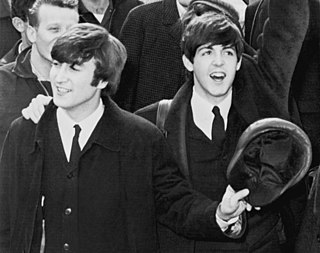
Lennon–McCartney was the songwriting partnership between English musicians John Lennon (1940–1980) and Paul McCartney of the Beatles. It is widely considered one of the greatest, best known and most successful musical collaborations ever by records sold, with the Beatles selling over 600 million records worldwide as of 2004. Between 5 October 1962 and 8 May 1970, the partnership published approximately 180 jointly credited songs, of which the vast majority were recorded by the Beatles, forming the bulk of their catalogue.

Ram is the only studio album credited to the husband-and-wife music duo Paul and Linda McCartney. Released on 17 May 1971 by Apple Records, it was recorded in New York with guitarists David Spinozza and Hugh McCracken, and future Wings drummer Denny Seiwell. Three singles were issued from the album: "Uncle Albert/Admiral Halsey", "The Back Seat of My Car" and "Eat at Home". The recording sessions also yielded the non-album single "Another Day".

McCartney is the debut solo album by English musician Paul McCartney, released on 17 April 1970 by Apple Records. McCartney recorded it in secrecy, mostly using basic home-recording equipment at his house in St John's Wood. Mixing and some recording took place at professional London studios. In its loosely arranged performances, McCartney eschewed the polish of the Beatles' past records in favour of a lo-fi style. Apart from occasional contributions by his wife, Linda, McCartney performed the entire album alone by overdubbing on four-track tape.

Red Rose Speedway is the second studio album by the English-American rock band Wings, although credited to "Paul McCartney and Wings". It was released through Apple Records on 5 May 1973, preceded by its lead single, the ballad "My Love". By including McCartney's name in the artist credit, the single and album broke with the tradition of Wings' previous records. The change was made in the belief that the public's unfamiliarity with the band had been responsible for the weak commercial performance of the group's 1971 debut album Wild Life.

Paul Is Live is a live album by Paul McCartney, released in 1993 during his New World Tour in support of his studio album Off the Ground, released that same year. Paul Is Live contains live recordings of McCartney and his touring band—which at the time included his then-wife Linda and guitarist Robbie McIntosh—performing songs by McCartney's former bands The Beatles and Wings, as well as songs from his solo career. The tracks included on the album were recorded at various concerts during his New World Tour, in several American cities and in Australia.
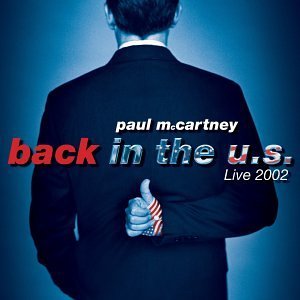
Back in the U.S. is a double live album by Paul McCartney from his spring 2002 Driving USA Tour in the US in support of his 2001 release Driving Rain. It was released with an accompanying DVD to commemorate his first set of concerts in almost ten years.
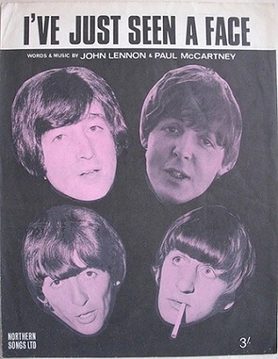
"I've Just Seen a Face" is a song by the English rock band the Beatles. It was released in August 1965 on their album Help!, except in North America, where it appeared as the opening track on the December 1965 release Rubber Soul. Written and sung by Paul McCartney, the song is credited to the Lennon–McCartney partnership. The song is a cheerful love ballad, its lyrics discussing a love at first sight while conveying an adrenaline rush the singer experiences that makes him both enthusiastic and inarticulate.

Let It Be is a 1970 British documentary film starring the Beatles and directed by Michael Lindsay-Hogg. The film documents the group's rehearsing and recording songs in January 1969 for what was to become their twelfth and final studio album Let It Be. The film includes an unannounced rooftop concert by the group, the last public performance of the four together.

"Band on the Run" is a song by the British–American rock band Paul McCartney and Wings, released as the title track to their 1973 album Band on the Run. The song was released as a single in April 1974 in the US and in June 1974 in the UK, following the success of "Jet", and became an international chart success. The song topped the charts in the United States, also reaching number 3 in the United Kingdom. The single sold over one million copies in 1974 in America. It has since become one of the band's most famous songs.
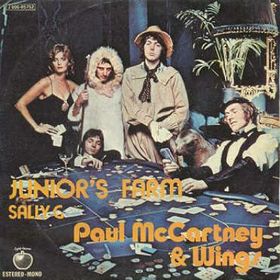
"Junior's Farm" is a song written by Paul McCartney and performed by Paul McCartney and Wings. It was issued as a non-album single by Apple Records in October 1974; it peaked at No. 3 in the United States and No. 16 in the United Kingdom.
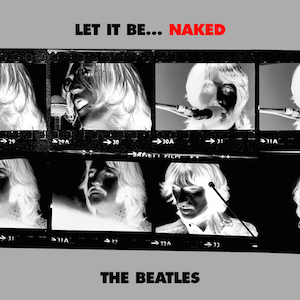
Let It Be... Naked is an alternative mix of the Beatles' 1970 album Let It Be, released on 17 November 2003 by Apple Records. The project was initiated by Paul McCartney, who felt that the original album's producer, Phil Spector, did not capture the group's stripped-down, live-to-tape aesthetic intended for the album. Naked consists largely of newly mixed versions of the Let It Be tracks while omitting the excerpts of incidental studio chatter and most of Spector's embellishments. It also omits two tracks from the 1970 release – "Dig It" and "Maggie Mae" – replacing them with "Don't Let Me Down", which was the non-album B-side of the "Get Back" single.
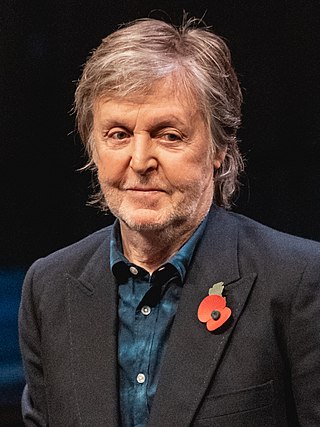
Sir James Paul McCartney is an English singer, songwriter and musician who gained worldwide fame with the Beatles, for whom he played bass guitar and shared primary songwriting and lead vocal duties with John Lennon. One of the most successful composers and performers of all time, McCartney is known for his melodic approach to bass-playing, versatile and wide tenor vocal range, and musical eclecticism, exploring genres ranging from pre–rock and roll pop to classical, ballads, and electronica. His songwriting partnership with Lennon is the most successful in modern music history.




















